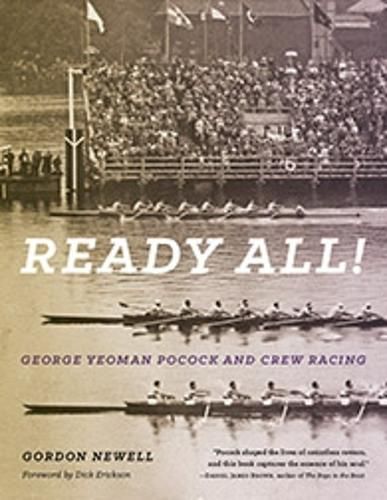Readings Newsletter
Become a Readings Member to make your shopping experience even easier.
Sign in or sign up for free!
You’re not far away from qualifying for FREE standard shipping within Australia
You’ve qualified for FREE standard shipping within Australia
The cart is loading…






This title is printed to order. This book may have been self-published. If so, we cannot guarantee the quality of the content. In the main most books will have gone through the editing process however some may not. We therefore suggest that you be aware of this before ordering this book. If in doubt check either the author or publisher’s details as we are unable to accept any returns unless they are faulty. Please contact us if you have any questions.
In the 1920s, an upstart West Coast college began to challenge the Eastern universities in the ancient sport of crew racing. Sportswriters scoffed at the crude western boats and their crews. But for the next forty years, the University of Washington dominated rowing around the world.
The secret of the Huskies’ success was George Pocock, a soft-spoken English immigrant raised on the banks of the Thames. Pocock combined perfectionism with innovation to make the lightest, best-balanced, fastest shells the world had ever seen. After studying the magnificent canoes built by Northwest Indians, he broke with tradition and began to make shells of native cedar.
Pocock, who had been a champion sculler in his youth, never credited his boats for the accomplishments of a crew. He wanted every rower to share his vision of discipline and teamwork. As rowers from the University of Washington went on to become coaches at major universities across the country, Pocock’s philosophy-and his shells-became nationally famous in the world of crew.
Drawing on documents provided by Pocock’s family, photographs from the University of Washington Crew Archives, and interviews with rowers who revered the man, Newell evokes the times as well as the life of this unique figure in American sport.
$9.00 standard shipping within Australia
FREE standard shipping within Australia for orders over $100.00
Express & International shipping calculated at checkout
This title is printed to order. This book may have been self-published. If so, we cannot guarantee the quality of the content. In the main most books will have gone through the editing process however some may not. We therefore suggest that you be aware of this before ordering this book. If in doubt check either the author or publisher’s details as we are unable to accept any returns unless they are faulty. Please contact us if you have any questions.
In the 1920s, an upstart West Coast college began to challenge the Eastern universities in the ancient sport of crew racing. Sportswriters scoffed at the crude western boats and their crews. But for the next forty years, the University of Washington dominated rowing around the world.
The secret of the Huskies’ success was George Pocock, a soft-spoken English immigrant raised on the banks of the Thames. Pocock combined perfectionism with innovation to make the lightest, best-balanced, fastest shells the world had ever seen. After studying the magnificent canoes built by Northwest Indians, he broke with tradition and began to make shells of native cedar.
Pocock, who had been a champion sculler in his youth, never credited his boats for the accomplishments of a crew. He wanted every rower to share his vision of discipline and teamwork. As rowers from the University of Washington went on to become coaches at major universities across the country, Pocock’s philosophy-and his shells-became nationally famous in the world of crew.
Drawing on documents provided by Pocock’s family, photographs from the University of Washington Crew Archives, and interviews with rowers who revered the man, Newell evokes the times as well as the life of this unique figure in American sport.